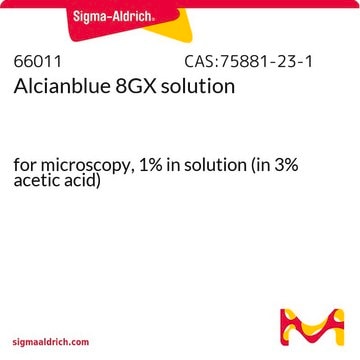B8438
Alcian Blue solution
1% in 3% acetic acid, pH 2.5
Synonym(s):
Alcian Blue 8XG solution
Sign Into View Organizational & Contract Pricing
All Photos(1)
About This Item
UNSPSC Code:
12171500
NACRES:
NA.47
Recommended Products
form
liquid
Quality Level
concentration
1% in 3% acetic acid, pH 2.5
technique(s)
microbe id | staining: suitable
color
dark blue to very dark blue
pH range
2.4-2.6
Amax
0.45-0.60 (1:400 in H2O)
application(s)
diagnostic assay manufacturing
hematology
histology
storage temp.
room temp
Application
Alcian Blue solution has been used in the histological staining of acidic glycosaminoglycans (GAGs; mucopolysaccharides) that are carboxylated or sulfated. Sulfated glycosaminoglycans appear to be the preferred substrate for alcian blue at pH 2.5. Alcian blue has been used to stain hyaluronan (HA), a nonsulfated GAG, but the intensity of the staining of HA is affected by the method of tissue fixation used. Alcian blue staining of GAGs in tissue may be modified through the addition of an electrolyte such as magnesium chloride.
Biochem/physiol Actions
Alcian Blue is a cationic dye. It forms insoluble complexes with acidic glycosaminoglycans, thereby aiding in the quantitative determination of glycosaminoglycans. It is also used for the staining of bone and cartilage.
Storage Class Code
12 - Non Combustible Liquids
WGK
WGK 2
Flash Point(F)
Not applicable
Flash Point(C)
Not applicable
Certificates of Analysis (COA)
Search for Certificates of Analysis (COA) by entering the products Lot/Batch Number. Lot and Batch Numbers can be found on a product’s label following the words ‘Lot’ or ‘Batch’.
Already Own This Product?
Find documentation for the products that you have recently purchased in the Document Library.
Customers Also Viewed
G F Pierce et al.
The American journal of pathology, 138(3), 629-646 (1991-03-01)
Recombinant platelet-derived growth factor (PDGF) and transforming growth factor beta 1 (TGF-beta 1) influence the rate of extracellular matrix formed in treated incisional wounds. Because incisional healing processes are difficult to quantify, a full-thickness excisional wound model in the rabbit
Differential staining of acid glycosaminoglycans (mucopolysaccharides) by alcian blue in salt solutions.
J E Scott et al.
Histochemie. Histochemistry. Histochimie, 5(3), 221-233 (1965-10-01)
SPECIFIC STAINING OF SULPHATE GROUPS WITH ALCIAN BLUE AT LOW PH.
R LEV et al.
The journal of histochemistry and cytochemistry : official journal of the Histochemistry Society, 12, 309-309 (1964-04-01)
Hao Wu et al.
Experimental cell research, 361(2), 324-332 (2017-11-04)
Mesenchymal stem-cell based therapies have been proposed as novel treatments for intervertebral disc (IVD) degeneration. The development of these treatment strategies, however, has been hindered by the incomplete understanding of the origin, biological properties of nucleus pulposus (NP) derived stem/progenitor
W Lin et al.
The journal of histochemistry and cytochemistry : official journal of the Histochemistry Society, 45(8), 1157-1163 (1997-08-01)
The apparent intensity of hyaluronan (HA) staining in tissue sections can vary as a function of fixation techniques. We examined the histochemical distribution of HA in normal human skin using an HA-specific binding peptide derived from bovine nasal cartilage. The
Our team of scientists has experience in all areas of research including Life Science, Material Science, Chemical Synthesis, Chromatography, Analytical and many others.
Contact Technical Service









